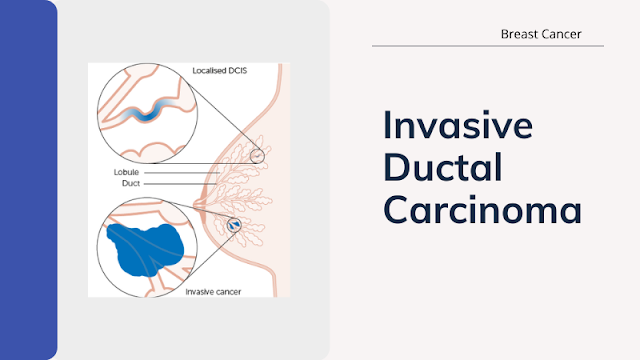What is Invasive Ductal Carcinoma?
Types of Invasive Ductal Carcinoma
- Invasive Lobular Carcinoma
- Infiltrating Lobular Carcinoma
Those mentioned above are the most common types of IDC.
Here are some of the rare types-
- Adenoid cystic carcinoma
- Low-grade adenosquamous carcinoma
- Medullary carcinoma
- Colloid carcinoma
- Papillary carcinoma
- Tubular carcinoma
Causes and symptoms of IDC
Research studies have discovered that this condition usually has its roots in the genetic mutations and is mostly inherited. Mutations of the tumor suppressor genes in breast cancer gene 1 (BRCA1), breast cancer gene 2 (BRCA2), and the presence of the ErbB2 gene, responsible for producing the HER2 protein, ultimately causes cellular proliferation. However, the underlying causes of these mutations are not known yet.
Symptoms
- Breast skin thickening
- Lump in breast
- Swelling in one breast
- Pain in a specific location of the breast
- Discharge from the nipple
These are the most common signs of IDC that require emergency medical attention.
Treatment Procedures for IDC
- Surgery- It helps to remove the tumor and make sure whether cancer has spread to the lymph nodes. This is a local treatment for the condition. The various surgical procedures are Lumpectomy and Mastectomy, which have been further subdivided into different categories and are preferred basing on the extent of the disease.
- Chemotherapy- Chemotherapy drugs are given orally or intravenously that travel through the bloodstream and attack the cancer cells. So, if your tumor is 1 cm in diameter or larger than that, chemotherapy is significant. The medications are often given in combination with targeted therapy drugs.
- Radiation Therapy- It is usually opted for after surgical procedures to conserve the healthy breast tissues. Radiation therapy is also helpful for reducing the chances of relapse. It utilizes high energy rays to destroy the cancer cells in the body.
- Hormonal Therapy- For hormone-receptor positive type IDC, this form of treatment is recommended. It is also called anti-estrogen therapy that helps to shrink cancer before surgery.
- Targeted Therapy- In this case, specific abnormalities are targeted within the cancer cells by the drugs and restrict the growth. This procedure is also known as a systematic treatment.
Important Medications
Palbociclib- Prescribed in combination with a type of hormonal therapy known as an aromatase inhibitor, Palbociclib 125 mg is used for the treatment of advanced state invasive ductal carcinoma in women or men who have not received hormonal therapy previously. It is a targeted therapy drug and has been classified as a CDK 4/6 inhibitor.
Capecitabine- It is a chemotherapy medicine that is also prescribed with other anti-cancer drugs to treat Invasive ductal carcinoma in its advanced stages. Note that, Capecitabine 500 mg is also effective for patients who have not shown any improvements to other chemo drugs. The dosage may be altered as per the condition.
Trastuzumab- If the patient has been diagnosed with HER2 positive type IDC, they can be prescribed Trastuzumab 440 mg. The drug will attach itself to the proteins and block them for stimulating the cancer cells to grow. It will also help to boost the immune system to kill the cancer cells.
Ribociclib- Patients with locally advanced hormone-receptor-positive HER2 negative type IDC can benefit from Ribociclib 200 mg. It is given along with an aromatase inhibitor to block the action of the enzymes on the cancer cells that help them grow and spread inside the body.
Everolimus- Classified as an mTOR inhibitor, Everolimus tablets are quite effective in treating metastatic HER2 negative IDC. They are used to conduct targeted therapy with the objective of interfering with the process by which cancer cells grow and divide.
Lapatinib- It is a tyrosine kinase inhibitor that is helpful for treating patients with HER2 positive type IDC who have already received at least a single chemotherapy. Lapatinib 250 mg interrupts the HER2/neu and EGFR pathways that, in turn, slow down or stops the cancer cells from proliferating.
Conclusion
IDC at its localized stage is very much of a treatable condition, and the survival rates are also quite promising. For instance, studies show that the 5-year relative survival rate in the early stages of IDC is 100%. With proper diagnosis and treatment, the condition is curable.



I was diagnosed as HEPATITIS B carrier in 2013 with fibrosis of the
ReplyDeleteliver already present. I started on antiviral medications which
reduced the viral load initially. After a couple of years the virus
became resistant. I started on HEPATITIS B Herbal treatment from
ULTIMATE LIFE CLINIC (www.ultimatelifeclinic.com) in March, 2020. Their
treatment totally reversed the virus. I did another blood test after
the 6 months long treatment and tested negative to the virus. Amazing
treatment! This treatment is a breakthrough for all HBV carriers.